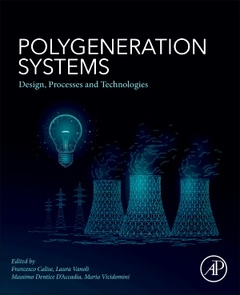Description
Polygeneration Systems
Design, Processes and Technologies
Coordinators: Calise Francesco, Vanoli Laura, Dentice D’Accadia Massimo, Vicidomini Maria
Language: English
Subject for Polygeneration Systems:
Keywords
?Absorption refrigerators; Adsorption refrigerators; Aluminum production unit; Bioenergy; Biofuels; Biological process; Biomass; Biorefinery; By-products; CCHP; Carbon capture; Cement industry; Chemical looping; Cogeneration; Combined cooling; Concentrated solar energy; Control strategy; Cost; Desalination; Distributed generation; District heating and cooling; Efficiency; Energy intensity; Energy price; Energy storage; Evaluation methods; Fossil fuel/renewable hybridization; Fuel cell; Fuels; Greenhouse gases; Heat and power; Heat pump; Heat recovery; Hydrogen; Industrial polygeneration; Iron and steel industry; LNG regasification; Mechanical process; NZEB; Natural gas; Natural gas reforming; Net zero; PV/T; Petroleum refinery; Photovoltaic; Photovoltaic modules; Photovoltaic–thermal; Polygeneration; Polygeneration layout; Positive Energy Building; Power plants; Prime mover; Processes; Renewable energy technologies; Smart energy system; Solar collectors; Solar energy; Solar hybrid systems; Storage; Storages; Sugarcane industry; Thermochemical process; Thermodynamic; Thermoeconomics; Trigeneration; Zero Energy Building
452 p. · 19x23.4 cm · Paperback
Description
/li>Contents
/li>Biography
/li>Comment
/li>
The support for polygeneration lies in the possibility of integrating different technologies into a single energy system, to maximize the utilization of both fossil and renewable fuels. A system that delivers multiple forms of energy to users, maximizing the overall efficiency makes polygeneration an emerging and viable option for energy consuming industries.
Polygeneration Systems: Design, Processes and Technologies provides simple and advanced calculation techniques to evaluate energy, environmental and economic performance of polygeneration systems under analysis. With specific design guidelines for each type of polygeneration system and experimental performance data, referred both to single components and overall systems, this title covers all aspects of polygeneration from design to operation, optimization and practical implementation.
Giving different aspects of both fossil and non-fossil fuel based polygeneration and the wider area of polygeneration processes, this book helps readers learn general principles to specific system design and development through analysis of case studies, examples, simulation characteristics and thermodynamic and economic data.
2. Utilization of renewable energy
3. Centralized and Decentralized energy systems
4. Polygeneration
5. Components for polygeneration system
6. Processes for polygeneration systems
7. Methodologies for polygeneration systems
8. Coal-based systems
9. Biomass-based systems
10. Solar-based systems
11. Hybrid renewable systems
12. Combined Cooling, Heat and Power systems
13. 4th generation district, heating and cooling network
14. Polygeneration systems in buildings
15. Control strategies and system optimization
Prof. Laura Vanoli, University of Naples Parthenope, Part of the LaTEC (Laboratory of Thermo-fluid dynamics, Energy, and HVAC systems) belonging to the Dipartimento di Ingegneria at the Università degli Studi di Napoli "Parthenope". Professor Vanoli has international scientific experience in the fields of computational thermo-fluid dynamics, finite elements, heat and fluid flow through porous media, fuel cells, geothermal energy conversion, energy planning, polygeneration systems, renewable energy sources, thermoeconomic analysis of energy systems and biomedical engineering.
Massimo Dentice d'Accadia is a mechanical engineer and holds a Ph. D. degree in Applied Thermodynamics. Presently, he is Full Professor of Energetics and Applied Thermodynamics at the University of Naples Federico II. He is also member of the advisory board of the Department of Industrial Engineering and Energy Manager in the same university. His fields of interest include thermodynamic and thermoeconomic analysis of advanced energy systems, energy saving, and renewable energy sources. On these topics, Professor d’Accadia has published numerous scientific papers, mostly in International journals and proceedings of international conferences. Currently, he is coordinator of government-funded research programs such as SAH
- Detailed economic data for technology to assist developing feasibility studies regarding the possible application of polygeneration technologies
- Offers a comprehensive list of all current numerical and experimental results of polygeneration available
- Includes simulation models, cost figures, demonstration projects and test standards for designers and researchers to validate their own models and/or to test the reliability of their results
These books may interest you

Energy Storage 225.05 €



